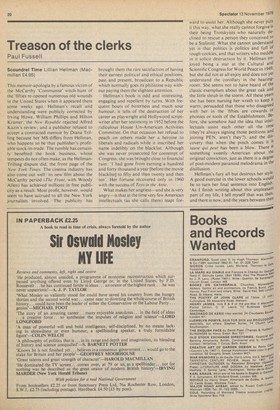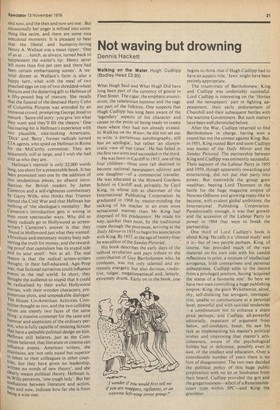Books and Records Wanted
CRANFORD, Good copy ill. by Hugh Thomson. Macmill° & Co (1891 reprinted 1892-5). Tel : 01-228 7247, GIDEON Crime novels, Lady Morland, Thornton-le'e' Yorkshire. LA MARE AU DIABLE and Francois Is Champi by George! Sand ill. Gertrude Leese. (Bell 1908). Also The Phoenix NeS. by J. R. Levy. (Ryder 1961), Write : Quentin, 5a Kensingt° Church Street, London W8. BOOKS ON CATHEDRALS, Churches, Monasteries' Abbeys, Gothic an and architecture, by Francis Bond, -1°.,n„n Harvey, Paul Frank! and others, Write : David Hay, 346 Lorlod" Road, St Albans, Herts. THE POETRY OF JOHN CLARE ad Tibble. (2 vole.) Cullingford, 59 Alexandra Road, Malvern. HENRY JAMES. Vols 8 & 9 of the pre-War II MacrntIns,n Pocket Edition. 0 D. Leavis, 12 Bulstrode Garden' Cambridge. MACHADO DE ASSIS titles wanted. 24 Cloudeslev S‘ludre' London Ni. LLEWELYN POWYS, SKIN FOR SKIN and BRIDLEGOOSE especially, but others. Stephen Surrey, 14 Church Land' Southampton.
THE ENGLISH .FACE by David Piper (Thames & Hudson) BLINDNESS by Henry Green. Box 721.
OLD STOCK EXCHANGE DIRECTORIES, Financial end. Banking Almanacks. British, Continental and N. Arnericdn Contact : Wiltshires, 1 Circus, Bath, Avon. CREATIVE ART OF GARDEN DESIGN by PercY cd„,nde (Country Life, 1967?). George Hutchinson seeks coPY in gdcondition 56 Doughty Street, London WC1. WAR MEMOIRS by de Gaulle (Vol 2. Unity, Vol 3. Salvatio_n TWENTIETH CENTURY REVIEW, issues lor 1961. Tilt, CHRISTIAN OUTSIDER by Raymond Billington (EOW1'd, Press) LITERATURE AND DOGMA by Matthew Arn°0, Heaheld, 3 Spring Lane, Packington. Ashby-de-la-20°C,, KARL KRAUS. All or any of his books in English or GeInne" P. K. Schumann, 43 Holland Street, London W8. NOVELS by Henry Green. Almanach de Gotha. A. KennV" 32 Castle Street, Wicklow Town. MAJOR ROAD AHEAD, edited by Rupert Croft-00°" Methuen 1939. Tel: 01-722 2695.
COLE. Recording of Mermaid Theatre production (1978)' Write Spectator Box 718.
and now, and the then and now are one . But occasionally her anger is refined into something like satire, and there are some nice anecdotal moments. It is pleasant to hear that the liberal and humanity-loving Henry A. Wallace was a mean tipper: 'One Of us at .. . lunch, as always, turned back to supplement the waiter's tip: Henry never left more than five per cent and there had been certain embarrassing scenes'. A teetotal dinner at Wallace's farm is also a happy turn, what with the meal of two Poached eggs on top of two shredded-wheat biscuits and the departing gift to Hellman of a fifty-pound bag of manure. She recalls that the funeral of the despised Harry Cohn of Columbia Pictures was attended by an Immense crowd, prompting George Jessel to remark : 'Same old story : you give 'em what they want and they'll fill the theatre.' One fascinating bit is Hellman's experience with two plausible, nice-looking Americans, 'Dick' and 'Betty', former radicals turned CIA agents, who spied on Hellman in Rome for the McCarthy committee. They are aPParently still at large, and I wish she had told us who they are.
Hellman's memoir is only 32,000 words Icing, too short for a presentable book. It has been promoted into one by the addition of two tendentious pieces, an absurd introduction for British readers by James Cameron and a self-righteous commentary by Garry Wills, who thinks that Truman started the Cold War and that Hellman has nothing of 'the ideologue's mentality'. But Cameron's introduction gets it wrong in even more spectacular ways. Why did so many radicals go to Hollywood as screenwriters? Cameron's answer is that they found in Hollywood just what they wanted : a frivolous and mercenary society busy subverting the truth for money, and the rewarding proof that capitalism has its stupid side and its sour, smell'. Not at all. The real reason is that the radical screen-writers thought, in their half-educated, Agit-Prop Way, that fictional narratives could influence events in the real world. In short, they thought the audience so stupid that it could be radicalised by their awful Hollywood movies, with their wooden characters, prebosterous plots, and unspeakable dialogue. The House Un-American Activities Comrnntee thought so too, and the two colliding forces are merely two faces of the same thing: a massive contempt for the taste and humour and scepticism of the ordinary perSOD, who is fully capable of resisting fictions that have a palpable political design on him. Hellman still believes, just as the Cornn1. ittee believed, that literature or cinema can influence events. American writers, she ltlatntains, are 'not only equal but superior in. talent to their colleagues in other countries, but they have given no leadership, Written no words of new theory', and she clearly means political theory. Hellman is, 4s Wills perceives, 'one tough lady'. But her Confusions between literature and action, tkhen and now, indicate how far she is from 'eing a wise one.



































 Previous page
Previous page